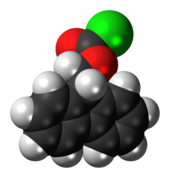Fluorenylmethyloxycarbonyl chloride
 |
|
 |
|
| Names | |
|---|---|
|
IUPAC name
Chloroformic acid 9H-fluoren-9-ylmethyl ester
|
|
| Other names
9-Fluorenylmethyl chloroformate; 9-Fluorenylmethoxycarbonyl chloride; Fmoc-chloride
|
|
| Identifiers | |
|
3D model (JSmol)
|
|
| ChemSpider | |
| ECHA InfoCard | 100.044.816 |
|
PubChem CID
|
|
|
|
|
|
| Properties | |
| C15H11ClO2 | |
| Molar mass | 258.70 g·mol−1 |
| Melting point | 62 to 64 °C (144 to 147 °F; 335 to 337 K) |
| Hazards | |
|
EU classification (DSD) (outdated)
|
Corrosive (C) |
| R-phrases (outdated) | R34 |
| S-phrases (outdated) | S26 S36/37/39 S45 |
|
Except where otherwise noted, data are given for materials in their standard state (at 25 °C [77 °F], 100 kPa).
|
|
|
|
|
| Infobox references | |
Fluorenylmethyloxycarbonyl chloride (FMOC-Cl) is a chloroformate ester. It is used to introduce FMOC group as the FMOC carbamate.
This compound may be prepared by reacting 9-fluorenylmethanol with phosgene:
The FMOC carbamate is often used as a protecting group for amines. The FMOC group can be introduced by reacting the amine with FMOC-Cl, e.g.:
The other common method for introducing the FMOC group is through 9-fluorenylmethylsuccinimidyl carbonate (FMOC-OSu), which may itself be obtained by the reaction of FMOC-Cl with the dicyclohexylammonium salt of N-hydroxysuccinimide.
It may be cleaved by bases, typically a solution of piperidine:
FMOC protection has found significant use in solid phase peptide synthesis because its removal with piperidine solution does not disturb the acid labile linker between the peptide and the resin.
Because the fluorenyl group is highly fluorescent, certain UV-inactive compounds may be reacted to give the FMOC derivatives, suitable for analysis by reversed phase HPLC. Analytical uses of FMOC-Cl that do not use chromatography may be limited by the requirement that excess FMOC-Cl be removed before an analysis of fluorescence.
Fluorenylmethyloxycarbonyl (Fmoc) group is used as a protecting group for amines in organic synthesis.
...
Wikipedia
